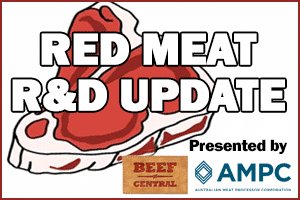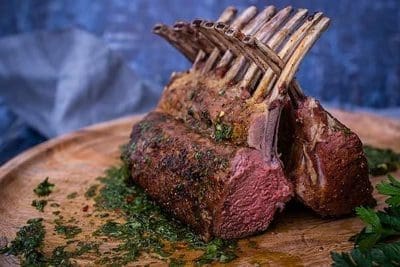 WELCOME to the fortnightly series of articles focusing on red meat R&D, presented by Beef Central and the Australian Meat Processor Corporation. These items will highlight a range of projects designed to enhance the efficiency, productivity, product quality and safety of Australian red meat sold into the domestic market and around the world.
WELCOME to the fortnightly series of articles focusing on red meat R&D, presented by Beef Central and the Australian Meat Processor Corporation. These items will highlight a range of projects designed to enhance the efficiency, productivity, product quality and safety of Australian red meat sold into the domestic market and around the world.
All have the ability to help underpin Australia’s unrivalled reputation as the world’s premier export of quality beef, lamb and offal. Links to previous articles in the series appears at the bottom of this page.
AUSTRALIAN consumers love a classic rack of lamb, especially one that has been beautifully frenched. But frenching cutlets is a resource-intensive task and processors are keen to find an easier way.
As the R&D organisation specifically supporting the processing sector, AMPC is working towards a better approach, to meet the needs of its sheepmeat processing members who highlighted waterless frenching as a key innovation area.

Not only has AMPC responded to members’ requests on this topic, it is moving quickly to take the program to the point where contracts with global providers can be established and processors can start to see the benefits in-plant.
The current options
In most processing facilities, frenching is done manually by skilled staff, who use up to 23 knife actions per 8-rib. That’s about 210,000 knife actions per operational shift within a plant operating at ten carcases per minute.
Needless to say, this has big implications for worker safety, with repetitive strain and lacerations the main concerns.
There are alternatives, but they have their drawbacks, too.
For example, some Australian plants are using a high-pressure water frenching solution. Although it works well in terms of the finished product, it is not suitable for all Australian locations.
The industry has supported a number of investigations into other approaches to waterless frenching, including wire cutting, ice jet cutting and robotic knives. These have all had a level of success but none to date has resulted in a commercial product offering.
So where does that leave the sector?
Processors have indicated that this remains a key area of innovation interest. When AMPC asked members to offer their thoughts on 100 innovation areas to focus on, waterless frenching was a popular response. In fact, members responsible for more than 50pc of Australia’s sheepmeat throughout wanted AMPC to keep working on this area, and so AMPC has reinvigorated its efforts to uncover new approaches.
Following consultation with levy payers representing more than 90pc of the sector’s throughput, AMPC has launched a number of Innovation Challenges, designed to uncover novel ways to address processor challenges. In some cases, that means brand new solutions, and in others it means evolving ideas that have been utilised in other sectors or for other purposes.
Waterless frenching is one of the Innovation Challenges currently under way.
AMPC would like to hear from providers/developers who believe that they could develop a solution that:
- Removes operational staff form knifing and holding the product. Removing the knife actions is the main focus, so semi-automated solutions would be an acceptable consideration.
- Uses no water during operations.
- Recovers the intercostal as a saleable product item. Ideally can remove the intercostals as a single ‘finger’ of meat.
If you are, or know, a solution provider or developer who would like to be financially supported by the Australian Meat Processor Corporation to demonstrate and evolve an offering in ‘waterless frenching’ and demonstrate it in meat processing environments, please reach out Stuart Shaw, Matt Deegan, Matt O’Bryan, or Amanda Carter.
In our next fortnightly article, we’ll talk additive printing and what it means for the meat processing sector.
Previous articles in this series:
- Could a futuristic exo-skeleton create new opportunity in the meat sector?
- Red Meat R&D: Upping our game in processing efficiency
- Magnetic conveying could leverage high-speed train technology for beef
